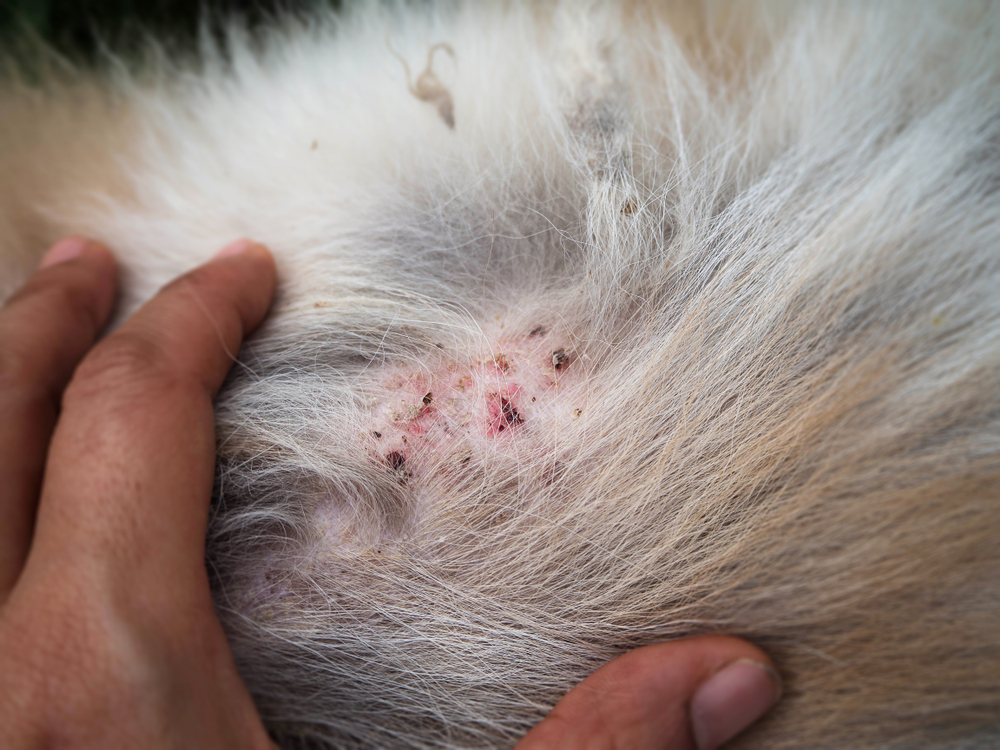Allergic reactions can take many forms in canines, from hives and vomiting to severe anaphylaxis, which is when a dog can’t breathe. There are so many causes of allergies that it can be hard to pinpoint the exact culprit to prevent these reactions from recurring. So, while severe allergic reactions always necessitate an immediate trip to the vet, even mild ones should be addressed by a professional.
Here, we discuss allergic reactions in dogs, what causes them, and what you can do to help.

What Are Allergic Reactions in Dogs?
The immune system is a finely tuned machine that reacts to intruders in the body by providing specialized killing cells that get rid of them. Things like bacteria, viruses, fungi, and even dust and mold can be whisked away with the right immune response. As part of that response, there is typically an influx of blood flow to bring the immune cells along. This can create swelling, redness, and itching as the body tries to right itself again.
In the cases of dogs with allergies, that immune response goes overboard when it encounters particular antigens or foreign objects like pollen, mold, or even ingredients in a dog’s food. Instead of quietly attacking and removing the antigen, the immune response can actually be more harmful, especially if it elicits a whole-body response known as anaphylaxis.
To develop an allergic reaction, a dog has to have come in contact with the allergen before, sometimes multiple times over the course of weeks to years. This means that allergies typically develop as the dog gets older and can be to things that they have been exposed to their entire life. As you can imagine, this makes determining what a dog is allergic to sometimes pretty difficult.
To top it off, the signs of allergic reactions in canines can look different, depending on the type.

What Are the Signs of Allergic Reactions in Dogs?
Allergic reactions can come in a few different forms. Typically, you’ll notice it on your dog’s skin. They may develop issues in one or two areas or all over.
- Itchiness, leading to scratching, licking, chewing
- Red bumps, welts, or hives
- Redness and heat
- Watery eyes
- Runny nose
- Shaking head and scratching ears
- Vomiting
- Diarrhea
More severe allergic reactions can present as:
- Swelling of the face or throat
- Pale gums
- Difficulty breathing
- Collapse
Any of these signs warrants an immediate trip to the emergency vet.

What Are the Causes of Allergic Reactions in Dogs?
A dog’s body can consider just about any imaginable substance an allergen. However, there are a few common types that will give you a good place to start your investigation:
- Food allergens: Chicken, beef, dairy, eggs, soy, wheat
- Environment: Pollen, mold, house dust mites, cleaning chemicals, smoke, detergents, plant oils
- Insects: Fleas, flies, mosquitos, bees, spiders
Dogs can inhale, touch, or eat an allergen, any of which can cause an allergic reaction. If they inhale it, they may experience watery eyes, a runny nose, and sneezing. If they come in contact with it, they may develop a rash on the lighter-haired parts of their body, such as the groin, belly, or ears. If they eat it, it can cause problems all over, including itchy and dry skin, chronic ear infections, or vomiting and diarrhea.
Allergies may be seasonal or last all year long. If your dog only seems to have trouble during the spring and summer, it may be due to pollen or certain plants. If they have issues all year, it may be due to house dust mites, your laundry detergent or the disinfectant for your floors.
Dogs can also develop allergies to fleas. So, while a typical flea infestation can cause any dog to twitch and scratch, those that are allergic to flea saliva can get a rash and extreme itchiness when they are bitten by one of these parasites. They may have red, angry bumps at the base of their tail or groin, which can easily turn into a flaring hot spot.
It’s important to note that hypersensitive dogs don’t need to have a flea infestation to develop flea allergy dermatitis; they can be bitten by just one flea in passing and mount an overly aggressive response, so you should have your dog on a year-round flea preventative.
If you are concerned about the health and well-being of your pet, seek veterinary advice for the best course of action.
Did you know you can speak to a veterinarian without having to travel? Just head over to PangoVet. It's our online service where you can talk to a vet online and get the advice you need for your pet — all at an affordable price!

How Do I Care for a Dog Experiencing an Allergic Reaction?
If your dog is having an extreme allergic reaction that includes difficulty breathing, sudden swelling of the face or throat, pale gums, or collapse, immediately seek veterinary care!
If your dog is having a milder reaction, such as itchiness, vomiting, or ear infections, you should still see a vet. Be ready to talk in length about your dog’s history, including when the signs started, if they’ve gotten worse, and what things have changed in their environment. Know what food your dog is eating and for how long, check if you’ve recently changed cleaning products or yard maintenance products, be ready to mention the addition of any new furniture or plants in your yard, and prepare to have your dog checked for fleas.
A vet will take it from there. After a thorough exam, including checking for fleas and flea dirt, they may run blood work, skin scrapings, or other tests to rule out other causes for your dog’s signs. The vet may also recommend skin or blood allergy testing.
If allergies are suspected, your dog may need a limited-ingredient or novel protein diet, and you may need to remove or replace chemicals or cleaning products in your home or start your dog on antihistamines or anti-inflammatories. Omega fatty acids and medicated shampoos may also help with itchy skin.
If your dog goes through allergy testing, they may also be eligible for allergy desensitization. This is similar to allergy shots in humans, where your dog is given small doses of the offending allergens frequently to help their body lessen the allergic response. Success rates are variable, though, and it can be quite expensive.

Frequently Asked Questions
What Are the Most Common Allergic Reactions in Dogs?
Flea allergy dermatitis is one of the most common allergic reactions seen in dogs. This is a reaction to compounds in the saliva, not the flea itself, so canines have to be bitten to be affected. A single bite is enough to cause an itchy, red rash in some dogs.
What Can I Give My Dog for an Allergic Reaction?
If your dog is having an allergic reaction, it’s best to see a vet, but if they are having sudden swelling of the face or throat, you may be directed to give them an antihistamine at home before making the trip. Always call a vet before giving any medications to your dog to make sure you offer the right product and dose.

How Do I Know What My Dog Is Allergic To?
Allergy testing can be done on a dog’s blood or skin. However, you may also be able to determine what they’re allergic to by noting any changes in their environment, such as a new plant or cleaning product. You can try removing these things from their surroundings to see if they respond better. This can be a time-consuming process, so don’t expect to know what your dog is allergic to overnight.

Conclusion
Allergic reactions in dogs can range from watery eyes to full-blown anaphylaxis with difficulty breathing and collapse. Anaphylaxis and severe allergic reactions require immediate veterinary attention. Milder allergic reactions of rashes, vomiting, diarrhea, or red and watery eyes should also be checked by a veterinarian so they can get your dog relief and to prevent more severe issues from happening in the future.
See Also:
- Are There EpiPens for Dogs? Anaphylaxis Explained (Vet Answer)
- Can Cats Be Allergic to Dogs? Vet Explained Info & How to Help
Featured Image Credit: Gladskikh Tatiana, Shutterstock




















